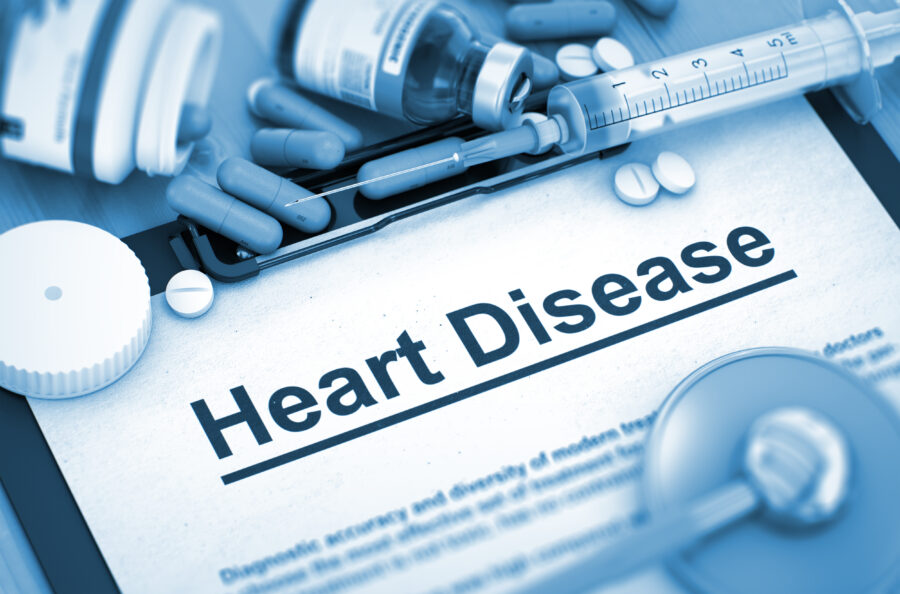How to Combat America’s #1 Killer, Naturally

When it comes to taking ownership of your personal health and wellness, paying attention to heart health tops the charts. That’s because heart disease is the leading cause of death in the United States. Unfortunately, this means, in the United States, one person dies every 36 seconds from this deadly disease.
The term “heart disease” refers to several types of heart conditions, but the most common type of heart disease is coronary artery disease (CAD). Coronary artery disease is a disease that affects the blood vessels. These blood vessels carry life-giving blood to every part of your body.
In this article, you’ll learn how to make lifestyle changes plus smart supplement choices that work. You will learn how to make your blood vessels resistant to disease, improve cholesterol levels, improve blood flow, and can unclog deadly build-up in your arteries, naturally. All while promoting overall heart health.
How Coronary Artery Disease Develops
When the major blood vessels that supply blood to your heart become damaged or diseased, coronary artery disease develops. While there are genetic factors associated with this disease, damage to your arteries is primarily lifestyle-related. It begins with a poor diet and lack of exercise and is made worse with excess alcohol, stress, and smoking.
These lifestyle choices lead to chronic inflammation and abnormal blood cholesterol levels. This leads to deposits (plaques) that block blood flow. Over time, the reduced blood flow can cause chest pain (angina), shortness of breath, or other complications like high blood pressure. A complete blockage can cause a heart attack. The good news is that by taking preventative steps, you can treat and even prevent coronary artery disease. Here’s how.

Lifestyle Factors and Heart Health
For many, signs of heart or coronary artery disease take years to manifest. Some experience slow changes in things like blood pressure, blood sugar levels, or differences in good and bad cholesterol. For others, they may get news of these changes during one visit to the doctor, which can come as a shock. This is because a poor diet, chronic inflammation, and excess stress don’t normally show up as pain in your arm. They can slowly cause damage to your blood vessels.
What’s important to remember is that when we don’t eat healthily, don’t get enough exercise, or have too much stress, the body responds. Our body’s natural response to these negative lifestyle habits is to trigger inflammation. When this becomes chronic, it can wreak havoc on your heart and artery health. This means when you add it all up, the food you eat, how much you exercise, and the quality of your sleep all go a long way. They assist in keeping inflammation from becoming a problem. Here’s how.
Manage Stress
We all have stressful times, but constant stress leads to inflammation. Start by changing your response to stress, whereas worry little about things out of your control. Try meditation or yoga, or keep a “gratefulness journal” to remind yourself of the things in life you should be thankful for.
Manage Blood Sugar
When people think of managing blood sugar, it is usually to manage their energy levels. That’s because high blood sugar levels eventually come down to below-normal levels, making you feel tired and lethargic. Yet, this short-term energy problem has long-term consequences for heart health. Eating foods that raise blood sugar to abnormally high levels, like white bread, rice, and pasta, as well as foods made with white sugar and flour cause the body to release high levels of the hormone insulin to remove the excess sugars from your bloodstream. This cycle of high to low blood sugar has been shown to affect the entire network of arteries that move blood throughout your body. It causes arterial walls to become inflamed, grow thicker than normal, and stiffer. All of which stress your heart and damage it. Over time, this can lead to heart disease, heart failure, heart attacks, and strokes.
Embrace the Power of Healthy Foods

It is well documented that a healthy diet is your first line of defense against abnormal cholesterol levels, high blood pressure, and high blood sugar levels, as well as maintaining an ideal weight. While it may seem complicated, a simple diet focused on lean proteins and whole foods high in fiber, such as vegetables, fruits, and whole grains, such as brown rice and whole-wheat bread is all it takes to support healthy blood sugar levels, fuel active muscle tissue, and allow you to feel more energetic. These foods give your body the nutrients it needs. They also keep you away from eating too many processed foods, unhealthy fats, simple sugars, and toxic preservatives.
Make Time to Exercise
It’s no secret that regular exercise brings about tremendous health benefits. The trouble is, too many people can’t seem to make time for it. The good news is that research has now shown that one 20-minute session of moderate exercise can stimulate the immune system and produce cellular changes that protect your heart and circulatory system from damage and keep it strong as you age. Make time for 20 to 30 minutes of aerobic exercise and 10 to 25 minutes of weight or resistance training. Getting active three to five times per week is a great way to protect against America’s #1 killer.
Get Sleep Hygiene Right
In recent years, the connection between sleep hygiene and a healthy heart and cardiovascular system has become well-established. Good sleep hygiene means following a stable sleep schedule, keeping your bedroom free of disruptions, and leaving digital devices alone before bedtime. On average, adults need 7-8 hours of sleep. If you’re having a hard time falling asleep, or feel sleepy during the day, you likely aren’t getting enough. In severe cases of poor sleep habits, you will hardly ever feel rested. This may be a sign of sleep apnea, a condition in which an airway temporarily collapses repeatedly during sleep, depriving the body of oxygen. This can cause a sudden heart attack or stroke. If you feel you may have sleep apnea, discuss this with your healthcare practitioner immediately.
Practice Smart Supplementation
As we’ve learned, our lifestyle plays an important role in preventing and possibly reversing coronary artery disease. But, what can you do if you’ve burned the candle at both ends? If you’ve lived less than a healthy lifestyle, or already been prescribed one, two, or more drugs to help reduce your chances of a deadly blockage in your arteries, or other forms of heart disease? First, you should never just stop taking your medications. You should consider adding natural supplements to your daily routine so that you can eventually reduce your risk of heart disease.

About the Author
 Zach Zovath graduated with a Bachelor’s degree in Exceptional Education from the University of Central Florida. He continued on to receive his Master’s degree from the College of Education and Human Performance at the University of Central Florida. He is a master-level personal trainer, coach, and health consultant. In addition, his specializations include corrective exercise, performance enhancement, prenatal/postpartum core stability, and exercise therapy. As a result of his education and experience in the health and fitness industry, he has developed fast and effective exercise programs for healthcare facilities.
Zach Zovath graduated with a Bachelor’s degree in Exceptional Education from the University of Central Florida. He continued on to receive his Master’s degree from the College of Education and Human Performance at the University of Central Florida. He is a master-level personal trainer, coach, and health consultant. In addition, his specializations include corrective exercise, performance enhancement, prenatal/postpartum core stability, and exercise therapy. As a result of his education and experience in the health and fitness industry, he has developed fast and effective exercise programs for healthcare facilities.



